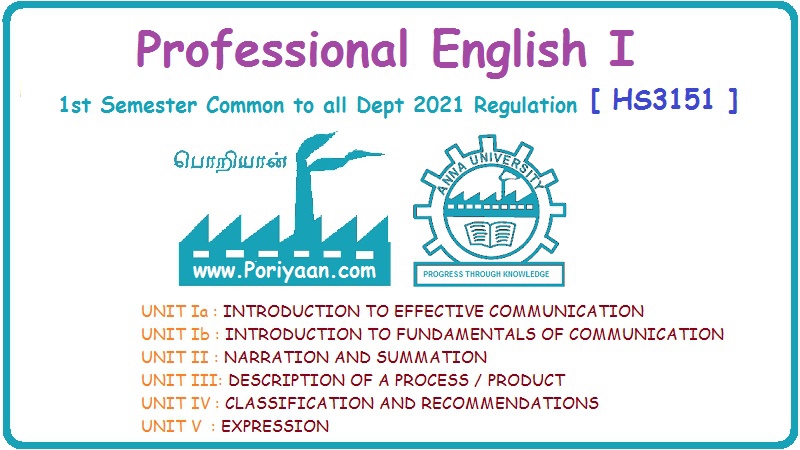Professional English I: Skill 2: Introduction to Effective Communication: Vocabulary
Vocabulary
Professional English
“Actions speak louder than words.” Do you agree? Sure, but sometimes words speak louder than anything else.
SKILL - 2 VOCABULARY “Actions speak louder than words.” Do you agree? Sure, but sometimes words speak louder than anything else. The words a person uses, or their vocabulary, will often tell their story. For example, isn't it shocking when the person who looks educated and dignified opens their mouth and their vocabulary horrifies everyone around them? What people say and how they say it, speaks volumes about who they are and what they are capable of. We use spoken and written words every single day to communicate ideas, thoughts, and emotions to those around us. Sometimes we communicate successfully, and sometimes we're not quite so successful. “That's not what I meant!” becomes our mantra (an often repeated word or phrase). However, a good vocabulary can help us say what we mean. For example, let's say that you are outside in your yard and see a large black car stop in the road. You can see four tinted windows on one side of the car, and you assume there are four tinted windows on the other side, too. Just then, the driver's door opens, and a man wearing white gloves steps out. He walks to the back of the car and looks underneath. He shrugs his shoulders, climbs back into the car, and drives away. After you remember to close your mouth, which has been hanging open, you run next door to tell your friend what you saw. Wh you know a couple of key words, you can quickly explain to this person what you saw. Instead of describing the number of windows and the length of the car, you could simply say that you saw a black limousine (a long, luxurious car). Then, instead of describing the man with the white gloves, you could say you saw the chauffeur (someone paid to drive a car or limousine) walk to the back of the car. Knowing these key words can help you quickly and effectively communicate your meaning Another way to develop a strong vocabulary is to read books with rich vocabulary. These books will help you see the words in context (in their natural settings). The context can help you guess the meanings of the words and can give you a good sense of how they're used. Be sure to pay attention to vocabulary words as you read. Write down words that you don't know and look them up. Try to find them elsewhere, and write down the sentences you find. Listen for them in the world around you. Write down the sentences that you hear. Study these words when you can, and try to use them in your speaking and writing. Another good idea is to keep a journal. Try to incorporate interesting words into your journal entry for the day (or week). If you're not sure if you're using the word correctly, ask a parent, a teacher, or a brainy friend. Vocabulary games are another great way to develop your vocabulary. You can find hundreds of ways to build your vocabulary. Who doesn't love playing games?. Do you have difficulty with homophones (words that sound alike)? Then try homophone games. You can even bone up on synonyms (words with similar meanings). Learning the meanings of root words is another way you can strengthen your vocabulary skills, so try these games and see what you know. Strengthening your vocabulary doesn't have to be boring!INTRODUCTION
Professional English I: Skill 2: Introduction to Effective Communication: Vocabulary : Tag: : Professional English - Vocabulary
Related Topics
Related Subjects
Professional English I
HS3151 1st semester | 2021 Regulation | 1st Semester Common to all Dept 2021 Regulation
